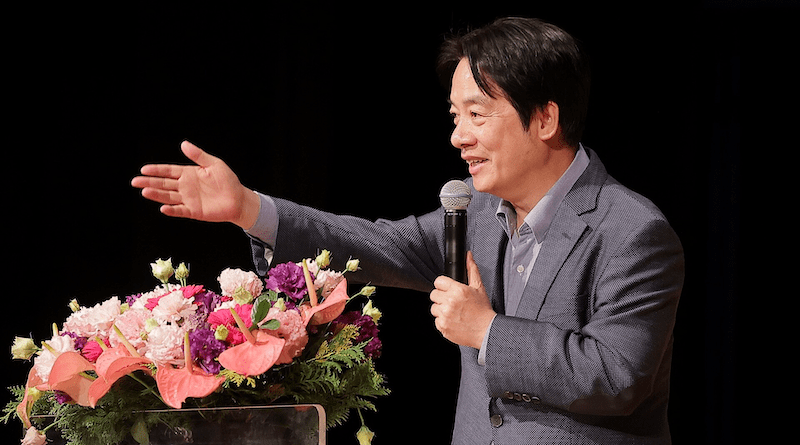Wary Of Crossing China, Most Of SE Asia Quiet On New Taiwan President-Elect – Analysis
By BenarNews
By Camille Elemia
Taiwan is a major investor and trading partner with Southeast Asia but most governments in the region only responded guardedly to the victory of a pro-independence candidate in the democratic island’s election last weekend, for fear of upsetting China, analysts said.
While the Philippine leader congratulated Taiwan’s Lai Ching-te who will take office as president in May, having bested two candidates viewed as pro-Beijing, most governments in the region kept their counsel – other than Myanmar’s junta which gave a fulsome statement of support for China’s sovereignty claim over Taiwan.
Experts such as Don McLain Gill, a lecturer at Manila De La Salle University, said that’s because the overriding concern of Southeast Asian nations is to preserve the region’s fragile peace.
Additionally, China’s power and economy also ensure Southeast Asian nations keep a low profile, they said.
“[R]egional states will still remain pragmatic in their engagements,” with China, Gill told BenarNews after the Taiwan presidential election.
“No Southeast Asian state seeks to provoke the security environment given that many are rationally engaging with China based on the objective reality of geography, power asymmetry, and economic dependence,” he added.
Beijing has maintained that Taiwan is part of its territory, with Chinese President Xi Jinping saying reunification is inevitable.
Following Lai’s victory in Taiwan, Chen Binhua, spokesperson for China’s Taiwan Affairs Office told Beijing’s state-run news agency, Xinhua, that the DPP “cannot represent the mainstream public opinion on the island.”
Beijing and Washington compete for influence in Southeast Asia, given the region’s proximity to both China and Taiwan.
And member-states of the Association of Southeast Asian Nations (ASEAN) have been performing a tightrope act, trying to maintain friendly relations with both superpower, even though five bloc members have territorial claims or maritime boundaries in the South China Sea that overlap with the sweeping claims of China.
Washington espouses a “one China Policy” that takes no position on sovereignty over Taiwan. Beijing’s “one China principle” holds that the People’s Republic of China is the only legitimate government of China, and that the island of Taiwan is an inalienable part of China.
While acknowledging Beijing’s position, Washington does not take a stance on its validity.
Of the ASEAN members, military-ruled Myanmar has perhaps shown the most support for China, saying in a statement Monday that “Taiwan is an integral part of the People’s Republic of China.”
Myanmar reiterated its unwavering support for China and said it opposed those “who supported Taiwan’s separation and independence and meddling in other countries’ internal affairs.”
Kwei-Bo Huang, at the National Chengchi University College of International Affairs in Taipei, sees no change in Southeast Asian countries’ policy on China.
“Economically collaborating with Taiwan while politically [being cautious of] any closer contact with Taiwan remains to be seen in Southeast Asia,” Huang, vice dean and associate professor of diplomacy at the university, told BenarNews.
Lai’s government could pose a potential threat to the region if “it cannot hold a self-restrained and less provocative policy toward Beijing,” Huang said.
“Higher risks in the Taiwan Strait will affect Southeast Asia’s trade and economic growth to a certain extent,” he added.
Taiwan, he said, can either be a troublemaker or peacemaker in the Indo-Pacific region.
“The U.S. government giving moral support to Taiwan is keen to see a more cooperative Taiwan government that can lead to peace and stability in the Taiwan Strait,” Huang said.
Marcos congratulates Taiwan’s president-elect
Meanwhile, ASEAN member the Philippines created a stir on Tuesday when President Ferdinand Marcos Jr. congratulated Taiwan President-elect Lai on X (formerly Twitter), angering China in the process.
“On behalf of the Filipino people, I congratulate President-elect Lai Ching-te on his election as Taiwan’s next president,” Marcos posted on X.
“We look forward to close collaboration, strengthening mutual interests, fostering peace, and ensuring prosperity for our peoples in the years ahead,” he said.
Lai responded to Marcos on the same platform, saying he looked forward “to enhancing our economic and people-to-people ties while championing democracy, peace and prosperity in the region.”
After Marcos posted his comment on X, his foreign affairs department swiftly reaffirmed Manila’s “one China policy.”
China’s foreign ministry also responded that same day, saying Marcos needed to “read more” to understand the Taiwan issue better.
“President Ferdinand Marcos Jr.’s message of congratulations on the Taiwan elections is a grave violation of the one-China principle and the communique on the establishment of China-Philippine diplomatic relations,” a spokesperson for the Chinese foreign ministry said.
The Chinese government summoned the Philippine ambassador in China over the issue,
Chinese Foreign ministry spokesperson Mao Ning said on Tuesday.
“The Chinese side is strongly dissatisfied and resolutely opposes this … This morning, Assistant Minister [of Foreign Affairs] Nong Rong summoned the ambassador of the Philippines to China … to give the Chinese side a responsible explanation,” foreign ministry spokeswoman Mao Ning said in a press briefing.
The Department of Foreign Affairs has not commented on the summons.
Philippine opposition Sen. Risa Hontiveros criticized Marcos, saying his actions and his administration’s policy were inconsistent.
“The administration should get its act together. We cannot have the president, the chief architect of foreign policy, say one thing, while the Department of Foreign Affairs says another,” Hontiveros said in a statement on Wednesday.
Still, “China has no business telling Filipinos what to say,” she said.
“They have no right to order us in the same way that they have no right to sail within the West Philippine Sea,” Hontiveros said, referring to the part of the South China Sea within Manila’s exclusive economic zone.
“As I’ve called for before, we must review this so-called one China Policy,” Hontiveros said.
“China has done far worse things in our territories compared to a congratulatory message to Taiwan.”

